
1980s in Bollywood: The decade offered a dizzying array of cinematic delights
Written by Shaikh Ayaz | Mumbai | Published: December 30, 2017 6:30 am ..
Written by Shaikh Ayaz | Mumbai | Published: December 30, 2017 6:30 am In the fourth of our on-going essay series called ‘Hindi classics that defined the decade,’ we look back at the 1980s Bollywood hits.
Most critics generally brush off the 1980s as a “low point” in Hindi cinema and the “lowest”, they demurred, was about to follow – the dreadful 1990s. Was this period, then, a veritable decline for Bollywood? Did the 1980s have nothing worth celebrating? Well, there was plenty to begin with. You merely have to look at the sheer versatility and variety of cinema on display in that decade to know that 1980s is just as important as any other. It’s a decade in which a period spectacle like Umrao Jaan rubbed shoulder with the madcap Jaane Bhi Do Yaaro and Govind Nihalani-Om Puri’s breakthrough Ardh Satya, considered a treasure of the art-house circuit while Mahesh Bhatt’s sensitive Arth shared sibling love with the seriously entertaining Mr India and Vidhu Vinod Chopra’s essential gangster best-seller, Parinda.
Musically, the Laxmikant-Pyarelal and RD Burman-era 1980s anticipated the Nadeem Shravan-infused saccharine melody of the 1990s. (Gulzar did some of his finest works in the 1980s, ending the decade with Ijaazat and Libaas). You could feel romance in the air, with the star-crossed love stories introducing two young men who have had a riveting hold on the audiences in wildly different ways. Ek Duuje Ke Liye, Kamal Haasan’s Hindi debut, Romeo-Julietified the trend for shock endings. Aamir Khan and Juhi Chawla’s breakout Qayamat Se Qayamat Tak followed the same path. Music was the soul of both films. Music was also at the heart of the success of Karz, with Rishi Kapoor flexing his rockstar-dom and so, one must say, Umrao Jaan whose mujras (performed with grace by Rekha), poetry (director Muzaffar Ali’s favourite Shahryar at work) and Khayyam’s immortal compositions are a throwback to 1950s classicism.
So, is 1980s really all that bad? Indeed, it had its misses and misfortunes, but overall, the decade saw an excellent mix of meaningful and commercially-minded hits that has inspired as many viewers to think as much as it has entertained. In the fourth of our on-going essay series called ‘Hindi classics that defined the decade,’ we look back at the 1980s Bollywood hits.
Karz (1980)
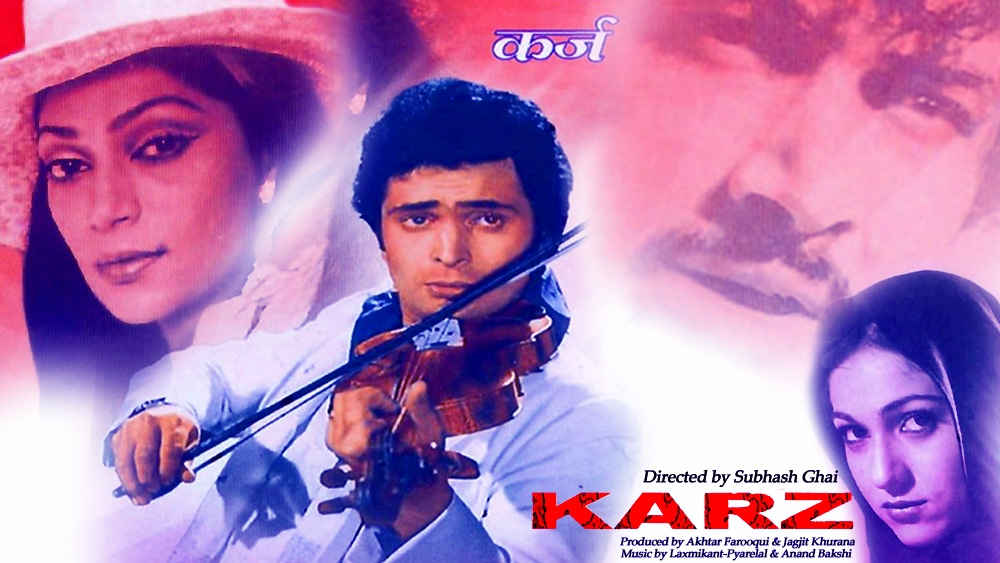
Today, this film is held up as a classic example of a “musical blockbuster,” in the canny phrasing of the Hindi cinema trade. But, if director Subhash Ghai is to be believed, it was a commercial flop on its release. “Every critic criticised that film,” Ghai told an interviewer. “In the 1980s, Karz was like today’s Kisna.” Karz infuses LP’s chartbuster music with Rishi Kapoor’s boyish charm and the ever-so-dependable theme of reincarnation. Farah Khan’s adoring tribute to Laxmikant-Pyarelal and Karz in Om Shanti Om says all that there is to say about this film’s continuing influence on today’s mainstream filmmakers. “I think it’s Subhash Ghai’s best film,” Khan once declared.
Khubsoorat (1980)
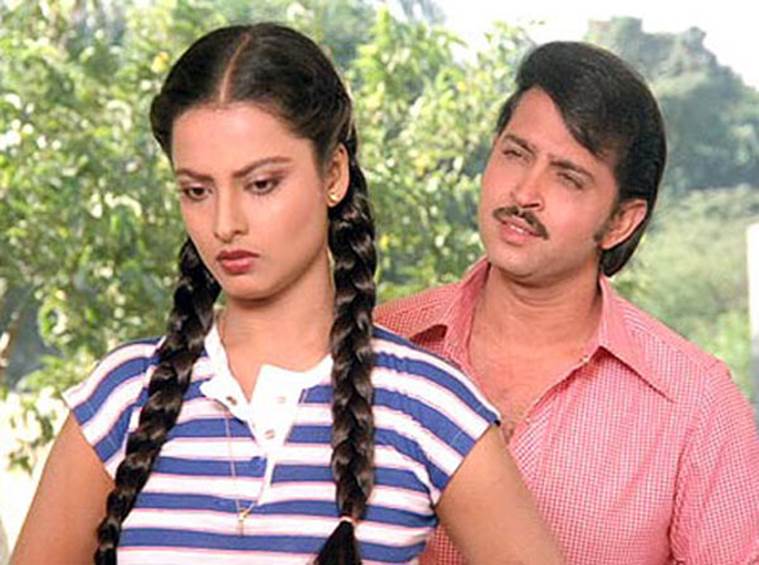
Khubsoorat is a little gem from Hrishikesh Mukherjee’s vast portfolio. Not his best but it manages to have many of the themes we associate with a Hrishida film. Familiar faces adorn the screen, especially a warm-hearted turn by Ashok Kumar as the henpecked husband sneaking in cigarettes when wife Dina Pathak is not around. Contrast this with David’s household, where life is one big party. The daughters (one of them played effervescently by Rekha) play games and trade ‘qaafiya’, but when the elder one gets married off into the Ashok Kumar family (who himself, as it turns out, is a closet music connoisseur holding a master class on the terrace) she has to follow the strict discipline set by the stern, principal-like Dina Pathak. Is life worth living with so many rules around? Rekha, who walks into the kitchen to grab an unwashed apple only to receive a cold stare from her future mother-in-law, will find out.
Umrao Jaan (1981)
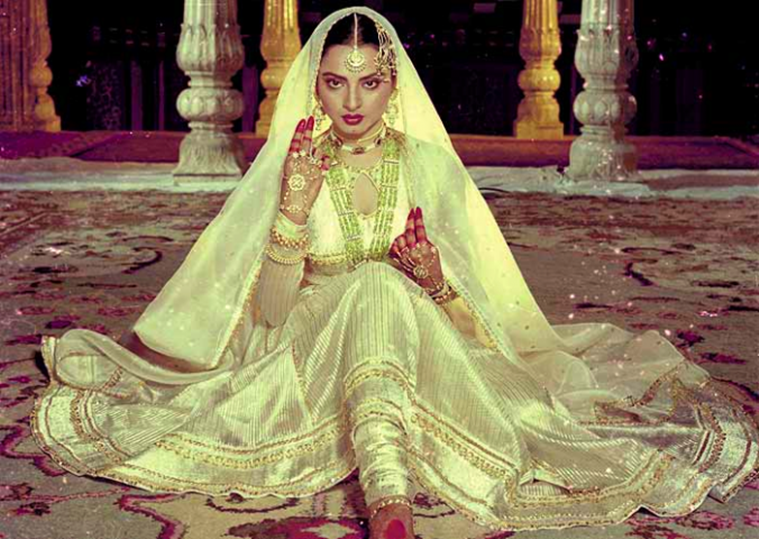
Muzaffar Ali’s account of a courtesan with a heart – and a literary gift – Umrao Jaan is an ode to the cultural flourishing of the 19th century marked by “peaceful coexistence between people that was manifested through poetry, music and the arts.” Rekha’s immortal title character is at once hopeful and heartbreaking. The climax, with her return to Lucknow as a much-celebrated courtesan, sees Umrao (Rekha) performing at the very place she once called home in the presence of her mother and brother. Shahryar put it best, in Yeh kya jageh hai dosto, “To what realm has life brought me?/ A place where I have no control over my happiness and no choice over my sorrow.”
Arth (1982)
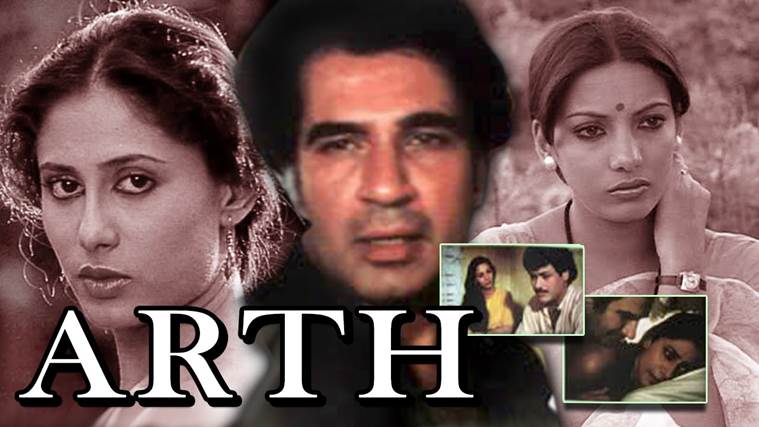
A common criticism against Mahesh Bhatt is that he makes the same film again and again. To be sure, Arth is the mother lode of all his cinema – it emerged from, to use the director’s own purple prose, an “emotional wasteland.” Based on personal experiences (confessional cinema, as some critics have pointed out), Arth is as intimate to the director’s core as it can get. Bhatt uses his famous extramarital affair with Parveen Babi to shape Arth into a sharp psychological portrait of a (rapidly falling) marriage. Kaifi Azmi’s poetry lends the film sensitivity and depth missing in the Bhatt stable’s later soundtracks.
Ardh Satya (1983)
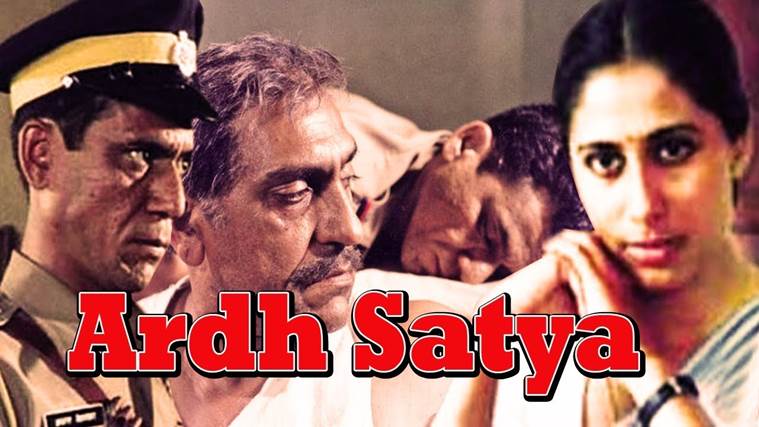
This is gritty, unblinking cinema at its volatile best. Vijay Tendulkar’s forceful screenplay provided the stage for Ardh Satya and the hungry talents of Om Puri, Smita Patil and Sadashiv Amrapurkar gave it wings. In the 1970s, we had seen the Salim-Javed creation Vijay capture wide public attention. Vijay of Zanjeer, as played by Amitabh Bachchan, was laconic and heroic. But Anant, Om Puri’s frustrated cop, is all too real to be heroic. Both are angry young men, but while Vijay learns to manipulate the system, often taking the route of crime Anant is done in by the very system he serves. Interestingly, Bachchan was said to be the first choice for Anant. Wonder how Om Puri’s career had shaped up if Ardh Satya had gone to Bachchan.
Jaane Bhi Do Yaaro (1983)
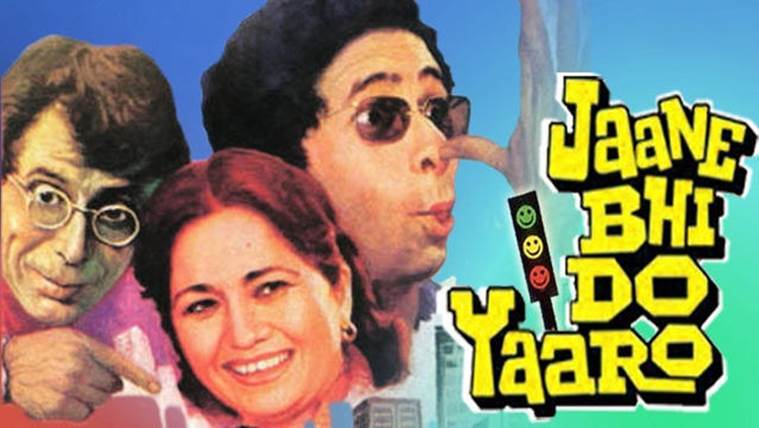
Naseeruddin Shah and the late Ravi Baswani are two goofy photographers, the perpetual losers who it seems can never hit it big. Pretty soon, in a stroke of great luck, they chance upon a prized scandal that has all the makings of a sensational headline. Jaane Bhi Do Yaaro brought together an ensemble of the finest talents that Hindi cinema would ever see – a real gathering of cinema titans. There was Vidhu Vinod Chopra, Sudhir Mishra, Om Puri, Satish Shah, Bhakti Bharve and Pankaj Kapur and only the mad genius of Kundan Shah could have brought them all on the same platform. At heart, Jaane Bhi Do Yaaro is a trenchant satire on nearly everything that ails India, of then and of today. Reportedly, a common refrain of the JBDY unit was, “Jaane Bhi Do Yaaro wasn’t planned. It just happened.” To date, the film remains uncategorizable.
Mr India (1987)
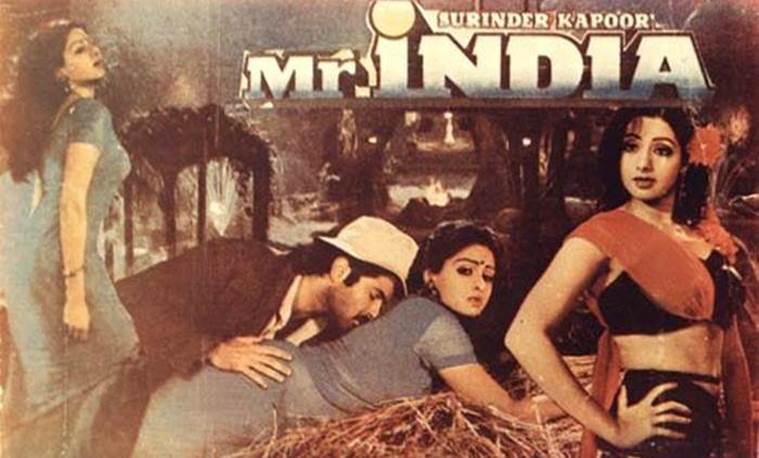
The most un-Shekhar Kapur film that Shekhar Kapur has ever made, Mr India is parts sci-fi and parts superhero with its alter ego formula and is full of a colourful cast of memorable characters. First off is Mogambo, the cartoonish villain immortalised by Amrish Puri. Mr India is played by Anil Kapoor, his look perhaps an inspiration from Chaplin/Raj Kapoor complete with a careworn jacket and hat. Sridevi, as the small-time reporter and the suspender-clad Annu Kapoor as an editor prone to answering wrong numbers, reveal a superlative talent for sitcom. Mr India was made thirty years ago. You can still catch a rerun of it on TV and never get bored. The stuff is familiar and yet, strangely, as fresh as it was in 1987.
Qayamat Se Qayamat Tak (1988)
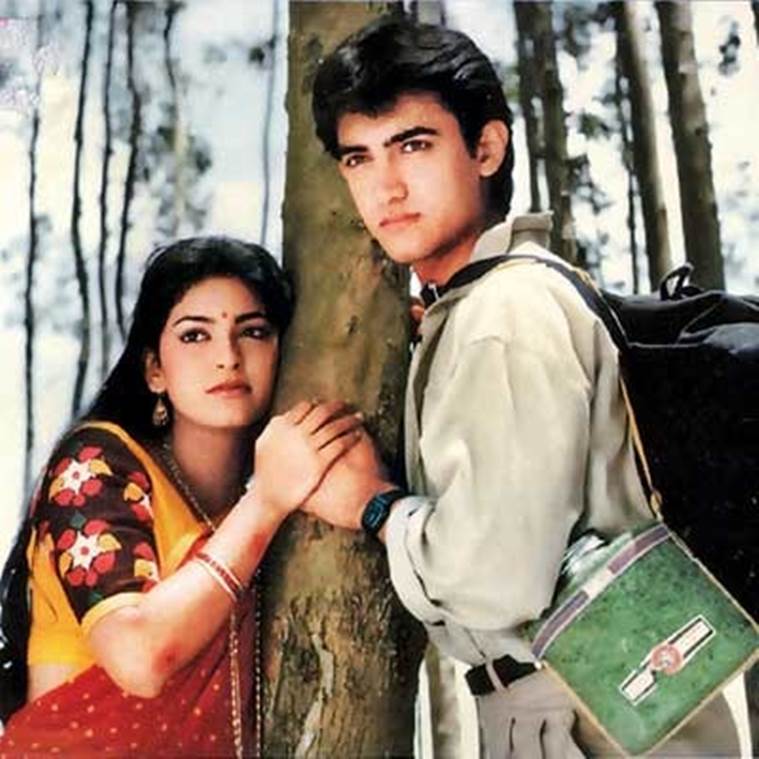
The star-making turn for the fresh-faced Aamir Khan and Juhi Chawla, Qayamat Se Qayamat Tak is a classic Romeo Juliet peppered with hill station-vibe songs, thanks to Anand-Milind’s melodic soundtrack. The trend for tragic romance was already set by Kamal Haasan-Rati Agnihotri’s Ek Duuje Ke Liye in 1981. The QSQT formula was milked by Bollywood for years, until the whole warring families-parental opposition thing went out of fashion circa-2000.
Parinda (1989)
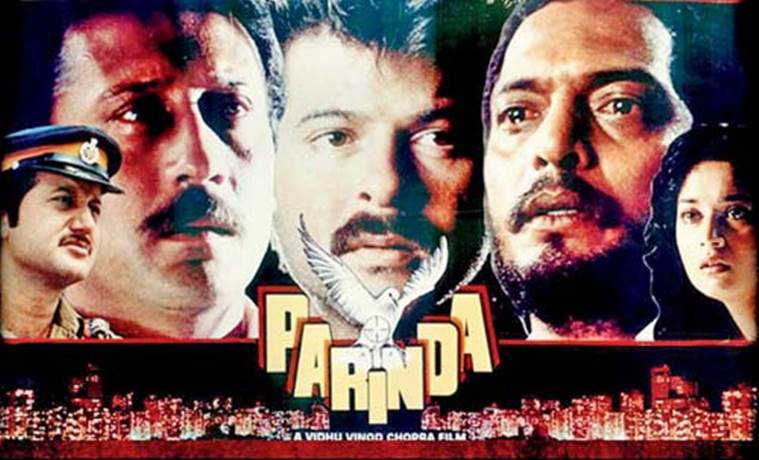
If there was no Ardh Satya, there would be no Parinda and if there was no Parinda, there would be no Satya. Vidhu Vinod Chopra’s gangland drama defined and redefined the mafia genre in Bollywood. Jackie Shroff and Anil Kapoor, who made for a rather macho screen pair, were the ideal candidates as brothers. One joins the gang headed by eccentric kingpin (Nana Patekar, petrified of fire), all the while trying his best to keep the younger sibling away from the world of crime. Usually, Anil Kapoor tended to steal the show in many Jackie-Anil combos due largely in part to the author-backed roles he got, but in Parinda, Jackie Shroff – suitably angry and injured – delivers the film all the way to its burning climax when he sets his former boss on fire.
Salim Langde Pe Mat Ro (1989)
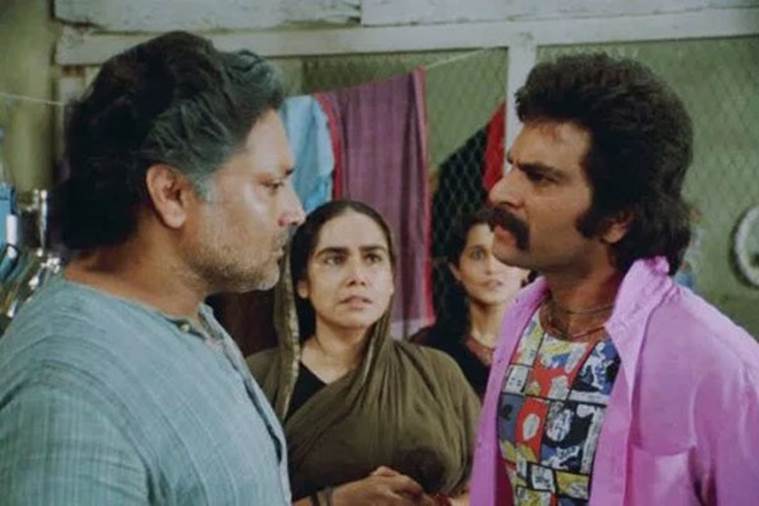
Narrated breathlessly by Pavan Malhotra, the small-time thief and protagonist of Salim Langde Pe Mat Ro, the film opens like Martin Scorsese’s Mean Streets. Spare a thought for the characters Salim is about to introduce. There’s his father, a mill worker, his mother and sister, his dead electrician brother, pigeon-raiser friend Abdul, Peera who, inspired by Hollywood films, wears sunglasses at night, Jaani Hippie and Rafiq, the restaurant owner – was Mirza making Nukkad? Mirza contrasts the brash, rouge-tongued, pro-Muslim Salim against Aslam, the secularist, soft-spoken, refined and broad-minded man who works as a proof-reader. Aslam is his sister’s suitor. Between them, they represent the two different faces of the Muslim community. Both are true and both exist. Similarities could also be drawn with Albert Pinto, Mirza’s other hero from another minority. Salim could well be an extension of Albert.
(Shaikh Ayaz is a writer and journalist based in Mumbai)
Related
Hindi classics that defined the decade: Shree 420 to Pyaasa, 10 immortal gems from 1950s Bollywood
For all the latest Entertainment News, download Indian Express App
© IE Online Media Services Pvt Ltd
The post 1980s in Bollywood: The decade offered a dizzying array of cinematic delights appeared first on News Wire Now.

